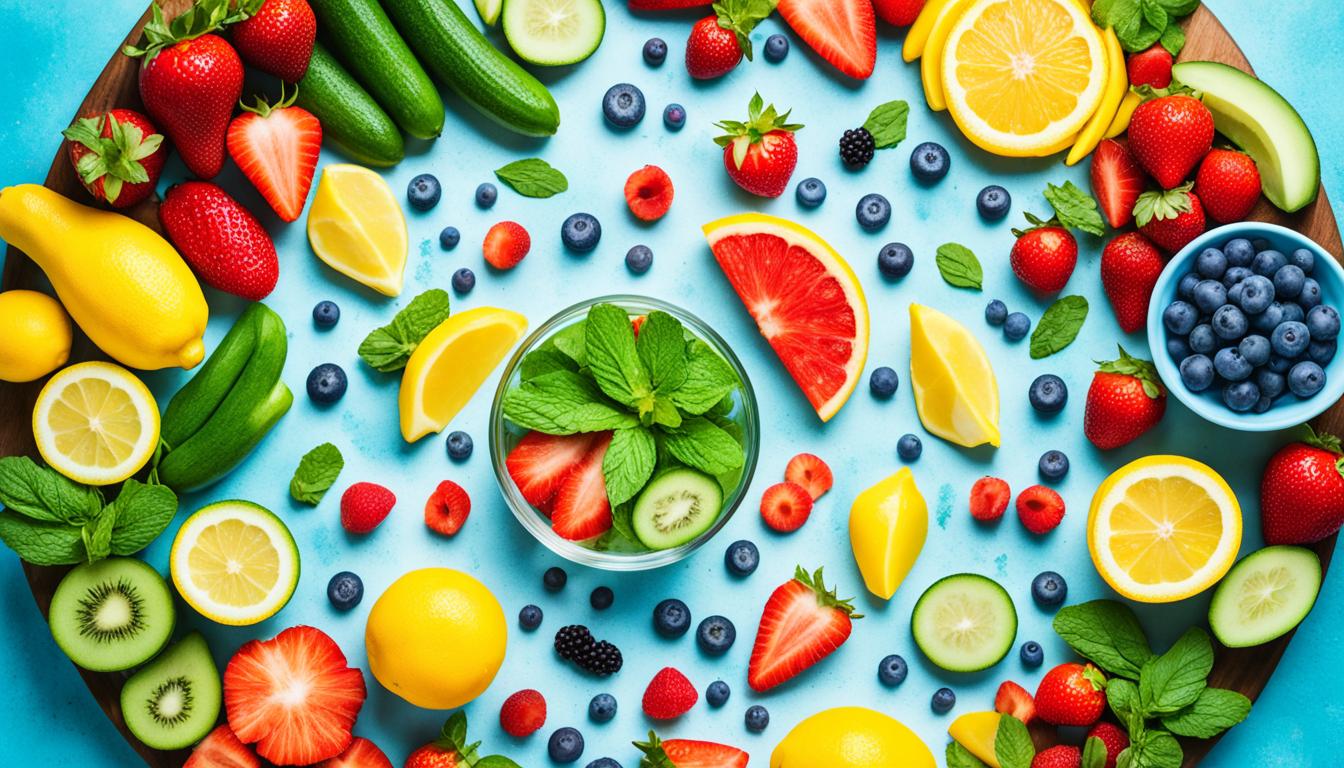Starting a water diet can greatly help your health and wellness. It aids in weight loss and could boost your health. Below is a step-by-step guide for beginners. It will make sure you do it right. This diet involves mainly drinking water. It aims for weight loss and health perks. You might drink cold water or only water while fasting.
Fasting for more than 24 hours isn’t usually advised. You should drink 2-3 liters of water each day when fasting. When fasting ends, add food back slowly to avoid issues. The CDC says slow weight loss is better than fast. It’s crucial to make goals that fit your weight and health. Always talk to a doctor before trying a water diet to make a plan that’s safe for you.
Key Takeaways
- A water diet involves primarily drinking water to aid weight loss and promote other health benefits.
- Most fasting regimes recommend fasting for no more than 24 hours at a time.
- It’s essential to consume 2-3 liters of water daily during fasting periods.
- Introduce food slowly after fasting to avoid refeeding syndrome.
- Consultation with a healthcare professional before starting a water diet is highly recommended.
Understanding the Basics of a Water Diet
The water diet grabs people’s interest as a way to lose weight. This can be as simple as drinking water before eating or as strict as not eating for a while. It’s key to know about it before trying, so you’re safe and it works well.
What is a Water Diet?
A water diet is when you drink a lot of water, especially before meals or when fasting. The idea is that water cuts your craving for food. It also swaps out drinks that have a lot of calories. But be careful, because some ways of a water diet mean you only drink water for days.
Who Should Consider a Water Diet?
Some people with health issues might find water diets helpful. This includes those at risk of obesity, diabetes, or heart problems. But always talk to a doctor first. This is especially true if you have a health condition or take medicine regularly.
Health Benefits of Starting a Water Diet
A water diet for losing weight has its perks. It can help you lose a little weight fast. Also, it may make your digestion better and your food cravings more balanced. Plus, it could lower your chances of getting obese.
There are also heart health benefits. For example, a whole day of fasting can cut down bad fats in your blood. This means a lower risk of getting heart disease. Some people also see their blood pressure and bad cholesterol get better.
Potential Risks and Safety Considerations
The water diet is not without its dangers. Since we usually get water from food, you might not drink enough. This can cause dehydration. Fasting for a long time alone can mess up your body’s salts, blood sugar, and even be dangerous when you start eating again.
It’s not for everyone, like people with heart problems, diabetes, or an unhealthy relationship with food. Pregnant or breastfeeding women and those with migraines shouldn’t try it either.
Doing this diet right is key. Only fast for a day or two, unless a doctor is watching. Start eating slowly and drink enough water each day. And, don’t be too active when you’re not eating to avoid feeling dizzy or fainting.
Summing it up, a water diet can help with weight and health, but be very careful and always get advice from a pro.
How to Start a Water Diet: Step-by-Step Plan
Starting a water diet needs careful thought and planning. Follow this step-by-step plan for a safe and effective beginning.
Setting Realistic Goals
First off, set realistic goals for your water diet. Use info like weight and BMI. The CDC says losing weight slowly works best. Keep track of your BMI and what you eat to learn about your body.
Preparing Your Body for a Water Diet
Getting ready for the diet is important. Start by cutting out certain foods a few days before. Drink 2-3 liters of water every day. This prepares you to drink more water when the diet starts. Avoid changing your diet suddenly.
Consulting with Healthcare Professionals
 They can make the plan fit your health needs. This is important, especially if you’re sick or taking medicine.
They can make the plan fit your health needs. This is important, especially if you’re sick or taking medicine.
Tips for Staying Hydrated
Staying hydrated is key during a water diet. Men should aim for 3 liters (13 cups) a day. Women need about 2.2 liters (9 cups). Drink water throughout the day. Watch your body to see when you need water. This keeps you hydrated.
Water Fasting for Beginners

Water fasting means not eating any food and just drinking water. It’s generally not recommended to fast for more than 24 hours without supervision. Before starting a water fast, it’s important to prepare well and follow certain steps to stay safe and get the most out of it.
It’s advised to drink 2-3 liters of water daily when fasting. Use water with minerals to avoid deficiencies. This helps you stay hydrated and prevent dizziness, weakness, and tiredness.
Before starting a fast, eating a balanced diet and staying hydrated is key. This prepares your body for the fasting period.
After fasting, slowly reintroduce food into your diet. Start with five small meals each day. This helps your body adjust and prevents a sudden shock to your system. The CDC says losing weight slowly is better long-term.
Water fasting has several possible benefits. It can change hormone levels, start ketosis, and reduce stress and inflammation. But, if you have health problems or take certain drugs, talk to your doctor first. Not everyone should try water fasting. Some might do better with other methods.
While there are benefits to water fasting, doing it for a long time without help is risky. Always put your health first. Follow safe fasting practices and see a doctor if you’re unsure.
| Duration | Recommended Water Intake | Post-Fast Nutrition |
|---|---|---|
| Up to 24 hours | 2-3 liters (mineralized water) | Gradual reintroduction with small meals |
| 24+ hours | Professional supervision required | Consult healthcare professional |
If you’re starting water fasting, plan carefully and follow the water fasting guidelines. This will help you enjoy the benefits of fasting while staying safe and healthy. Always make sure to consult a healthcare professional before embarking on a fasting journey.
Water Diet Tips for Success
To make a water diet really work, it’s key to pick the best strategies and support. Here are crucial tips for a water diet to boost your health goals.
Choosing the Right Type of Water
Picking clean and safe drinking water is a must for a water diet. Go for water that’s been filtered well or comes from a reliable source. Drinking 2-3 liters of water a day, especially mineralized water, keeps you well-hydrated and replaces vital minerals.
Monitoring Your Hydration Levels
Keeping an eye on how hydrated you are is very important. Men should aim for 3 liters (13 cups) of water and other fluids a day. For women, about 2.2 liters (9 cups) is best. How often you pee can tell you if you’re drinking enough. Watch out for signs of dehydration and adjust your water intake as needed.
Combining Water Diet with Light Exercise
Pairing your water diet with easy exercises can make it even more effective. Try activities like walking or yoga. Skip intense workouts since they can be hard on your body without extra fuel. Light exercises with a water diet help burn calories and make you feel better all around.
Using Apps and Tools for Tracking Progress
Today, tech tools can really help you track your water diet’s progress. Use apps, fitness trackers, and diet logs to keep an eye on your water, exercise, and food. These tools make it easier to stick to your water diet and reach your goals.
By heeding these water diet tips – selecting good water, watching your hydration, adding in light exercise, and using apps to monitor – you’re setting yourself up for a safe and successful journey.
Conclusion
Looking back on a water diet journey, we see that it should match each person’s health. It’s key to get advice from a health professional before starting. Several studies found that a water diet can lower blood pressure and help lose weight. A 2022 study, for instance, showed blood pressure improvement in overweight people after a water fast followed by refeeding. Still, it’s important to weigh the positives and negatives.
Starting a water diet might show quick benefits, like less insulin in your blood and shedding pounds. But, there can also be dangers, such as higher uric acid, dehydration, and the risk of ketoacidosis. For some people, like those with health conditions, pregnant, nursing women, or who take daily medicine, this might not be a good idea. Making sure you drink enough water and talking to a doctor are vital.
To stay at a lower weight after a water diet, commit to eating well and staying active. Support from things like fitness apps can help keep up the good work. Also, checking your health and staying hydrated are crucial for the best results. Fast weight loss may seem attractive, but it’s better to focus on methods that are safe and steady. By thinking through water fasting carefully, you can enjoy its advantages while staying safe.




